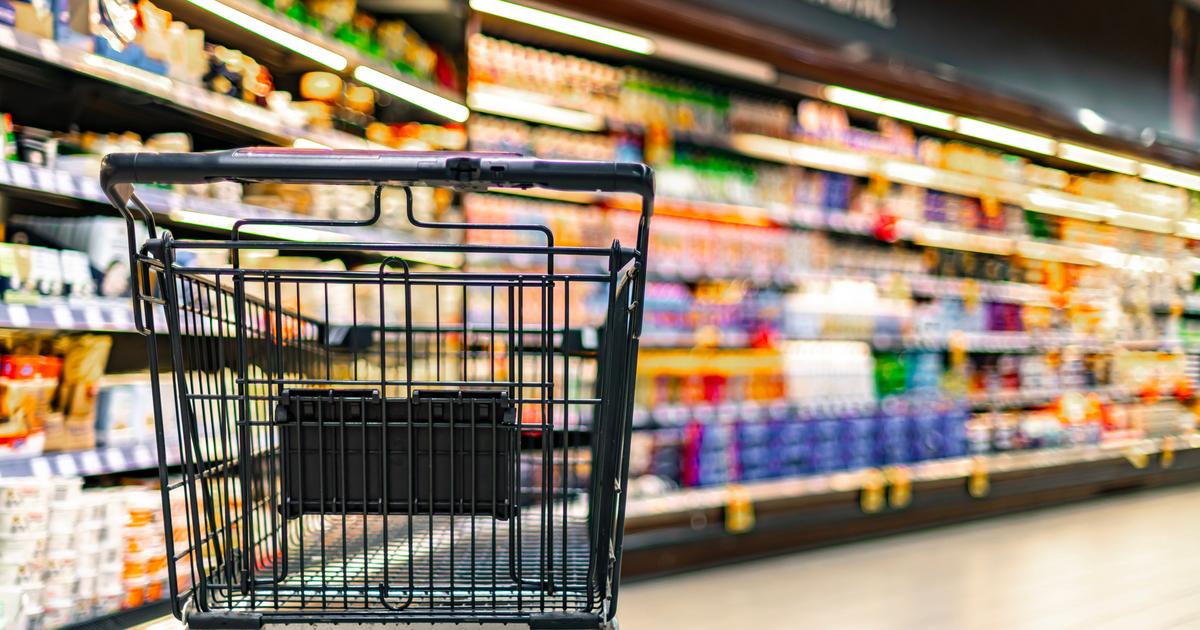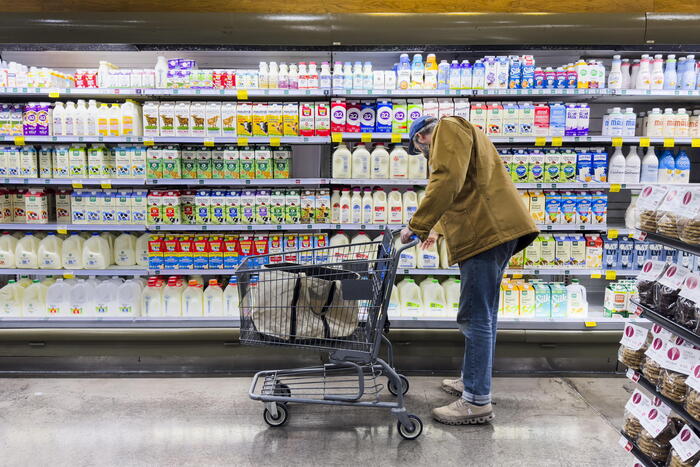According to one expert, food price increases over the past twelve months are likely to persist. © Fabian Sommer/dpa
Many dairy products and coffee have recently become noticeably cheaper again. Is this a signal that the worst of the price increase in the supermarket is over?
Düsseldorf - More and more prices in the German food trade are slipping. This week, Aldi, Edeka, Rewe and Co. announced permanent price reductions for numerous dairy products such as milk, quark, cream and yoghurt. In total, more than 50 dairy products would be up to 15 percent cheaper, the discounter reported. The Kaufland chain even promised price reductions for more than 350 dairy products.
As early as April, the prices for butter had been lowered by the major retail chains and in February the prices for coffee in the entry-level price range.
So is the wave of price increases in the food trade, which is painful for many consumers, coming to an end? Could prices now perhaps slip again across the board?
There are some arguments against it
The reason for the rise in food prices is the cost increases in the entire value chain - for raw materials, energy, packaging and logistics, emphasized the chief executive of the German Food Trade Association (BVLH), Franz-Martin Rausch, in an interview with Mediengruppe Bayern. For retailers, this has not only increased purchase prices, but also the costs for transport and logistics, heating and cooling systems have increased massively.
"Just as the price increases in the food supply chain have only made themselves felt in consumer prices with a time lag, the easing of producer prices will only gradually become visible in food sales prices," predicted the industry expert.
Retail expert Robert Kecskes from the market research company GfK expects that the rate of price increase this year will not be as high as in 2022. However, he considers it rather unlikely that prices will fall significantly again across the board. With regard to a large part of the price increases of the past twelve months, he says: "I suspect that this will not go away."
Controversies between distributors and manufacturers
"What you're seeing right now is that retailers are cutting prices for their private labels," Keckes said. The pioneers are the discounters, who thus pass on falling raw material and energy costs to customers. What the future price development of branded goods will look like, however, depends largely on the outcome of the current controversies between retailers and manufacturers - on whether retailers succeed in fending off further price demands from major brand manufacturers.
0
Also Read
Pension will soon rise by an average of 70 euros – but only for certain groups
READ
Hacker attack on savings bank subsidiary – thousands of employees sent home
READ
Dispute over drought strawberries: Spanish farmers angry with German environmentalists
READ
Habeck's heating law: The year of construction could be decisive when replacing the heating system
READ
EU Commission wants to massively increase tobacco tax: This is how expensive smoking will be
READ
Fancy a voyage of discovery?
My Area
Rewe boss Lionel Souque emphasized that the retail giant was "prepared to take into account justified commodity-based cost increases, but only as long as they are justified". The company's priority is the interest of its customers.
A look at the inflation rate shows that the latest price cuts have so far been more of a drop in the ocean. Despite initial price reductions for individual products, food prices in May were 14.9 percent higher than in the same month last year, according to figures from the Federal Statistical Office.
According to the Dairy Industry Association, the fact that prices for dairy products in particular have now started to slide is due to the current large supply of milk in Germany and Europe. In view of the high prices last year, many farmers have increased production, said the association's chief executive, Eckhard Heuser.
However, the easing of milk prices could be short-lived. There are many indications that the market will calm down in the coming months and that "firmer prices" can be expected again as early as autumn, Heuser said. Which would mean that consumers would then probably have to dig a little deeper into their pockets for milk and cream.
For many people in Germany, the hope that food will soon become cheaper again is low anyway. According to a recent survey by the management consultancy EY, 70 percent of consumers assume that food prices will continue to rise. Dpa










/cloudfront-eu-central-1.images.arcpublishing.com/prisa/2C5HI6YHNFHDLJSBNWHOIAS2AE.jpeg)



